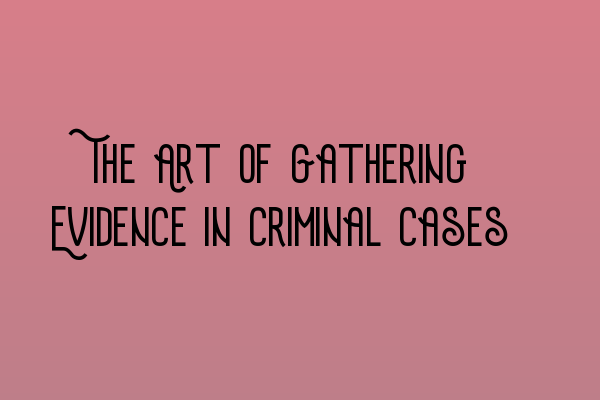Welcome to the SQE Criminal Law & Practice Law UK blog! In this post, we will delve into the art of gathering evidence in criminal cases. As solicitors, it is crucial for us to understand the importance of gathering solid evidence to support our clients’ cases. Effective evidence collection can make all the difference in securing a favorable outcome in court.
Before we dive into the details, let’s quickly recap the related articles to give you a broader understanding of the legal landscape:
- Legal Representation for Delaware LLCs in the UK: Expert Advice
- Ensuring Ethical Business Practices: Delaware’s Code of Conduct
- Legal Challenges for UK Businesses in the U.S.: Strategies for Overcoming Hurdles
- Legal Challenges for UK Businesses in the U.S.: Strategies for Overcoming Hurdles
- SQE Exam Prep: Essential Study Materials for Aspiring Solicitors
The Importance of Gathering Evidence
In criminal cases, the burden of proof lies with the prosecution. As defense solicitors, our duty is to gather evidence that refutes the prosecution’s claims or casts reasonable doubt on their case.
Evidence can come in various forms, such as witness testimonies, expert opinions, physical evidence, or digital data. The quality and admissibility of evidence can greatly influence the outcome of a trial.
Types of Evidence
1. Witness Testimonies
Witness testimonies play a vital role in criminal cases. They can provide firsthand accounts of events, identify suspects, or corroborate or challenge other evidence. It is crucial to gather witnesses’ statements as soon as possible to preserve accurate recollections.
Sometimes, witnesses may be reluctant to come forward or testify. In such cases, we can employ various strategies, such as offering witness protection, invoking legal mechanisms, or demonstrating the value of their testimony to encourage their cooperation.
2. Expert Opinions
Experts in relevant fields can provide valuable insight and analysis to strengthen our clients’ cases. Whether it’s forensic experts, medical professionals, or digital forensics specialists, their opinions can help interpret complex evidence and provide context to the court.
Collaborating with reputable experts and obtaining their reports can add significant weight to our arguments and bolster the defense’s position.
3. Physical Evidence
Physical evidence refers to tangible objects or materials that can be presented in court. Examples include weapons, fingerprints, DNA samples, or surveillance footage. Careful collection, preservation, and analysis of physical evidence are instrumental in building a solid defense.
4. Digital Evidence
In today’s digital world, digital evidence is becoming increasingly relevant in criminal cases. This can include data from computers, smartphones, social media accounts, or surveillance systems. Understanding how to obtain, interpret, and present digital evidence is vital in modern criminal investigations.
To ensure the admissibility and integrity of digital evidence, it is essential to work closely with digital forensics professionals who specialize in data retrieval and analysis.
Challenges in Gathering Evidence
Gathering evidence in criminal cases can be challenging due to various factors, including reluctant witnesses, time constraints, or the complexity of digital data. It requires meticulous planning, effective communication, and strong investigative skills.
Moreover, the legal landscape is constantly evolving, with new challenges emerging regularly. Staying informed about legal updates, procedural changes, and technological advancements is crucial to adapt our evidence-gathering strategies accordingly.
Conclusion
Gathering evidence is an art that requires precision, perseverance, and a deep understanding of the legal system. As solicitors at SQE Criminal Law & Practice Law UK, we strive to master this art to secure the best possible outcomes for our clients.
We hope you found this article insightful and informative. For more in-depth insights on related legal topics, don’t forget to check out the links below:
- Legal Representation for Delaware LLCs in the UK: Expert Advice
- Ensuring Ethical Business Practices: Delaware’s Code of Conduct
- Legal Challenges for UK Businesses in the U.S.: Strategies for Overcoming Hurdles
- Legal Challenges for UK Businesses in the U.S.: Strategies for Overcoming Hurdles
- SQE Exam Prep: Essential Study Materials for Aspiring Solicitors
